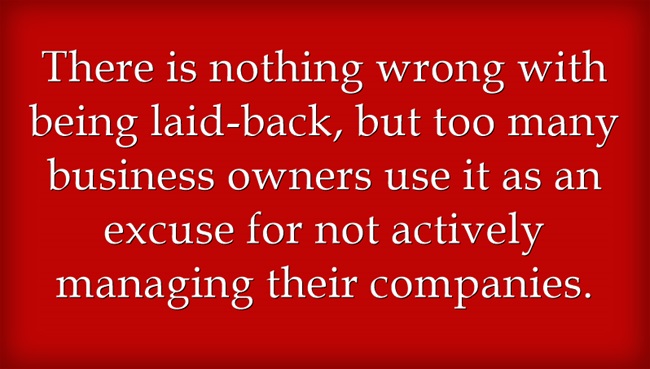One of the first decisions – consciously or unconsciously – people make when they become the boss is what their management style is going to be. Some decide theirs is going to be “laid-back.” Unfortunately, a laid-back style rarely, if ever, works. It is frustrating to the employees, customers, and the owner.
So, how did you become a business owner?
➢ Did you start your company?
➢ Or maybe you bought an existing business?
➢ Was the management of the family business finally turned over to you?
➢ Were you an employee who rose through the ranks?
No matter how you got there, it is an exciting time when you first become an owner. You get the chance to put your mark on the business with nobody telling you what to do. You can do things the way you think they should be done – “better and different.”
There are many reasons why having a laid-back management style does not work; here are two of the most common.
Complacent vs. laid-back
Commonly, owners who identify themselves as laid-back are not, what they are is complacent. Complacency, at best, is an ineffective management style. At its worst, it is harmful and has been the cause of many business failures. Complacent people have strong denial about the health of their company. They deliberately ignore problems, complaints, danger signs and instabilities with their financials, employees, products, and customers. Owners who are complacent say things like, “We’ve always done it this way.” “I don’t want to rock the boat.” “Let’s wait and see.” “Maybe next year.”
Complacent management results in: decreased productivity, declining quality, employee dissatisfaction, poor cost controls, theft of materials/money/product/time, not enough cash flow, poor bidding/estimating processes and customer complaints. All of which directly affect the bottom line and the long term success of the company.
Inefficient vs. efficient
Laid-back owners commonly have feelings of – unjustified – pride and satisfaction in their management style. They think that being a “nice guy” is enough to be an effective manager. It is not. For a company to survive long-term nice guys also need to provide accountability, metrics, leadership (not friendship), structure, communication, incentives, and vision. You can be laid back, but you also must be active.
By far, the most significant problem employees have with laid-back owners is, “he’s a nice guy, but a lousy boss.” Here are some of their complaints:
- He doesn’t hold anyone accountable. People get away with stuff all the time.
- He doesn’t keep his word. He says he’s going to do something but doesn’t do it.
- I gave up trying to make things better. He seems to listen but never does anything about problems.
- The good workers get overloaded; while he lets the bad workers get by.
- I never know what is going on, neither does anyone else.
- I would like to know how I’m doing; there is never any feedback.
- The good people are ignored, even though we do all the work. I want to move up in the company, but no one notices the job I’m doing.
- Everybody knows he’s a soft touch. If someone doesn’t want to do something they go to him and they don’t have to do it. He undermines other bosses all the time.
Every business owner wants to know how to attract and keep good employees. Overwhelmingly, good employees say they want to work in an environment where they can be efficient and productive. They want communication and structure. Finally, they want a workplace that has fair, evenly applied rules, incentives, and expectations.

Their laid-back management ‘style’ is the reason they give for avoiding the responsibilities of good leadership. However, good leadership is not a matter of intensity; it is a matter of integrity.
At Cogent Analytics, we never stop looking for ways to improve your business and neither should you. So, check out some of our other posts for helpful business information:



